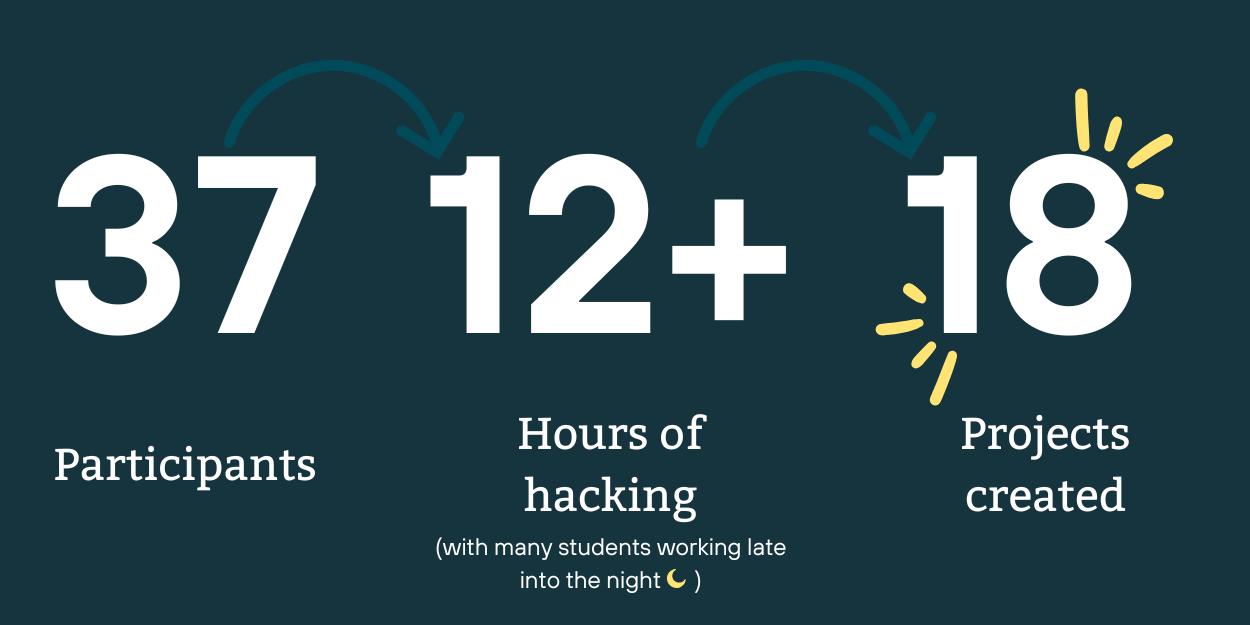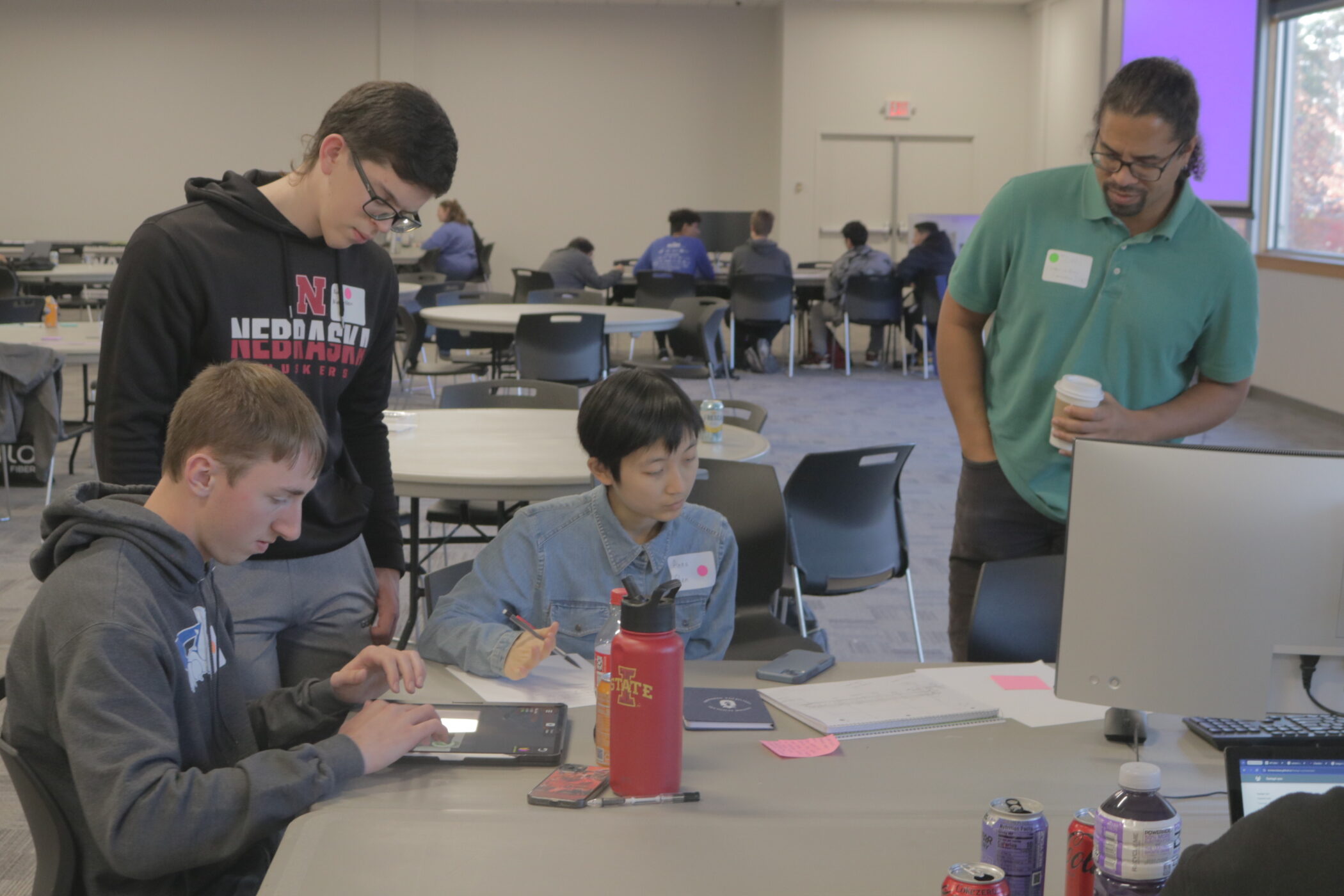Building Innovation in Rural Nebraska: A Look Back at the Tech Builders Challenge
The next generation of rural innovators were on display at the Tech Builders Challenge in Seward, Nebraska.
The next generation of rural innovators were on display at the Tech Builders Challenge in Seward, Nebraska. This hackathon style-event marked a significant milestone for both the Seward community and the Center on Rural Innovation’s mission to foster tech ecosystems in rural America.
With support from our key partners—the Economic Development Administration (EDA), the Seward Chamber of Commerce, the Seward County Visitors Bureau, Allo and Concordia University—we witnessed an outpouring of creativity, collaboration, entrepreneurial energy and momentum to solve problems using technology.
The Tech Builders Challenge is a hackathon-style weekend event that serves as a launchpad for rural students to explore tech innovation, develop hands-on coding and business-building skills, and build confidence as problem-solvers, technologists and future entrepreneurs. This year’s challenge— the first of its kind for CORI and Seward, brought together over 30 students from Concordia University, many from the computer science department but also several from agriculture and business disciplines, forming a truly interdisciplinary innovation experience.
Starting Friday afternoon, participants dove into ideation workshops and technical sessions, forming eight dynamic teams. For hours—well into the night—these students worked on crafting their tech solutions, with some staying as late as 3 a.m., completely immersed in their projects. On Saturday morning, teams returned energized and ready to fine-tune their demos, practice their pitches, and deliver standout presentations during the final pitch session.

The results? A showcase of ingenuity and practical tech applications that reflected this rural community’s unique strengths and challenges. Among the standout ideas were a robotic device designed to manage waste for small caged animals, a tracking tool to monitor pig health, and a matchmaking service to help high school students find their ideal college. The team who took home “best in show” developed an app to connect farmers with helpers during disasters, addressing critical gaps in agricultural resilience. One of the agriculture students behind that project, Jenna Muntz, said “I really loved not only learning about coding, but seeing the vision in my head get made into something that works.”
Events like this lay the groundwork to put rural communities at the forefront of innovation by equipping them with the right resources and support. By providing hands-on opportunities for students, we’re helping to build a pipeline of future rural innovators.
Key Highlights and Takeaways
The Power of Collaboration
This event was made possible by the dedication and expertise of the CORI staff, Concordia University faculty, and Seward-area partners. A CORI software developer offered personalized guidance to each team, ensuring that students could troubleshoot issues and refine their tech solutions. He said of the event: “I was so impressed by the students’ ability to work together and come up with some amazing product ideas and actually make progress in building and developing.”
Collaboration with Concordia University and the Seward Chamber of Commerce played a key role in the success of this event. Their support helped recruit participants and brought local enthusiasm, expertise and resources to the table, creating a vibrant and inclusive environment.
"The Nebraska Tech Builders Challenge was a huge success thanks to the support of the CORI team… Our county's first hackathon engaged local students and community members to continue developing our tech workforce.”
Jonathan Jank, President & CEO of the Seward County Chamber & Development Partnership
Participant and Community Impact
Feedback from students and faculty was overwhelmingly positive, some shared that this was the most engaging and supportive hackathon they had attended. Concordia University’s Assistant Professor of Computer Science remarked “Collaboration and communication across the student body was amazing. Students were focused the entire time and it was inspiring to see that.” It was particularly notable that the event included not only students from the Computer Science department, but was truly interdisciplinary and inclusive of all students— allowing for a greater and more diverse exchange of ideas.
“Overall it was a great experience. Just being able to work with people from the CS team and agriculture department was a great experience and I learned a lot.”
Noah Niederklein, Computer Science student, Concordia University
Rural Innovators Solving Rural Problems
The event’s challenge focused on rural innovation for the benefit of Seward County and beyond, participants were encouraged to ideate and build solutions that would address issues they observe in their daily life and community. The result? Truly innovative concepts for products and services that solve uniquely rural issues. The ideas – like a robotic device designed to manage waste for small caged animals, a tracking tool to monitor pig health, an app to help farmers manage their stock in emergencies, and a new solution for testing soil quality – are unlikely to be developed by those hailing from major metros, and this speaks to the critical nature of greater innovation and opportunities for people all across America to participate in the innovation economy and launch a business as a means to solve a real problem and drive impact.
“Collaboration and communication across the student body was amazing. Students were focused the entire time and it was inspiring to see that.”
Concordia University’s Assistant Professor of Computer Science
Looking Ahead
The Tech Builders Challenge is just the beginning. CORI and our partners are already exploring ways to build on this momentum and continue fostering opportunities for rural innovators in Nebraska and beyond. Stay tuned as we work to scale this model to other communities and develop even more impactful programming, and if you would like to build and bring a hackathon to your rural community, reach out to us!
For now, we celebrate the success of this event and look forward to seeing how these students—and their ideas—shape the future of rural innovation.
Get in contact with our team today!
By submitting this form, you are consenting to receive marketing emails from: . You can revoke your consent to receive emails at any time by using the SafeUnsubscribe® link, found at the bottom of every email. Emails are serviced by Constant Contact


